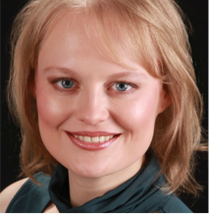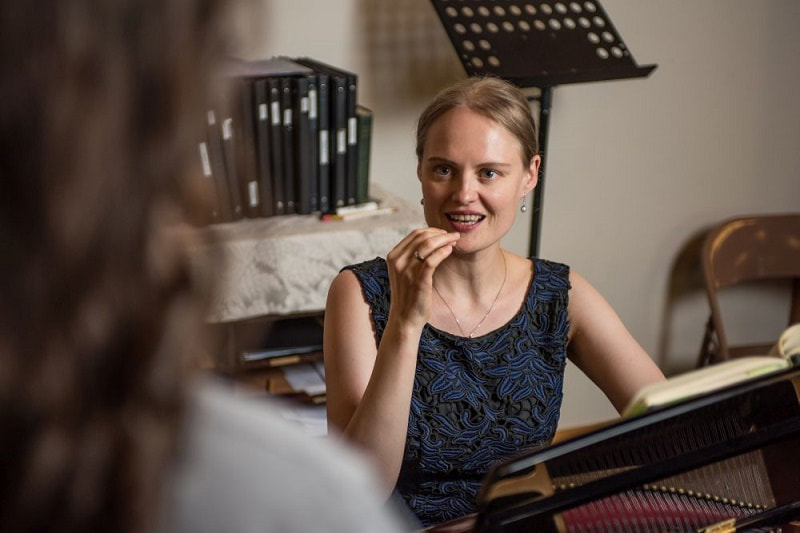|
GVAI’s German Operetta and Opera workshop is up and running and we have lots of fun improving the German diction in the arias with the goal to sound like a German native singer. I cannot tell you how wonderful it is, (Sometimes I get goosebumps.) when a singer finally gets the sound right and I have the feeling I am at home teaching German singers. This is such a rewarding experience and makes everybody satisfied and confident in the work together. I even get lost and continue my instruction in German instead of in English and then, of course, we laugh a lot. I want to start a series of blog posts today in which I want to make sure, you also can avoid very common mistakes singers make when singing in German. Sometimes even singers who feel very confident about their language, often realize during coaching that they have in fact a hard time to differentiate the degree of openness and closeness of vowels or the right position of the ich- or ach- sound. Although IPA is a great help, it does only give you an approximate sound. I hope these posts will benefit you, increase your joy of singing Lieder and exploring more German language operas and oratorios. If you want to have certain topics covered, please let me know in the comments. I am glad to help. Let’s get started today with the u-umlaut (ü). I have chosen this topic while teaching Franz Schubert’s Winterlied (Winter song). And what a coincidence that we have snow in Seattle today, schools are closed and many companies as well. Coming from Germany, snow is something normal for me, but I admit, I am very excited to experience it in Seattle where it happens extremely seldom. We got big, beautiful snowflakes today. Schubert’s Winterlied has a lot of ü- sounds, some of them are short, some long. For a lot of students, it is difficult to distinguish these two sounds. They think they already sing the vowel long, but in fact, they don't. But if you know the rules and develop your ear through practice and good feedback (if possible with a native German speaker), it will be easy for you. Here are the lyrics of Franz Schubert's Winterlied. Keine Blumen blühn; nur das Wintergrün blickt durch Silberhüllen; nur das Fenster füllen Blumen rot und weiss, aufgeblüht aus Eis. Ach! Kein Vogelsang tönt mit frohem Klang; nur die Winterweise jener kleinen Meise, die am Fenster schwirrt,und um Futter girrt. Minne flieht den Hain,wo die Vögelein sonst im grünen Schatten ihre Nester hatten; Minne flieht den Hain, kehrt ins Zimmer ein. Kalter Januar, hier werd' ich fürwahr unter Minnespielen Deinen Frost nicht fühlen! Walte immerdar, kalter Januar! You can find a translation here and the score here. 1. Let’s have a look at all words that contain an ü. 2. Mark the umlaut in your score or write them on a sheet of paper. 3. Underline the consonants following the ü. I did it here for you: Keine Blumen blühn; nur das Wintergrün blickt durch Silberhüllen; nur das Fenster füllen Blumen rot und weiss, aufgeblüht aus Eis. Ach! Kein Vogelsang tönt mit frohem Klang; nur die Winterweise jener kleinen Meise, die am Fenster schwirrt, und um Futter girrt. Minne flieht den Hain, wo die Vögelein sonst im grünen Schatten ihre Nester hatten; Minne flieht den Hain, kehrt ins Zimmer ein. Kalter Januar, hier werd' ich für/wahr unter Minnespielen Deinen Frost nicht fühlen! Walte immerdar, kalter Januar! Lucky cheat sheet: The vowel is pronounced long, if it is followed by a single consonant, a silent h, a double vowel ie The vowel is short, if more than one consonant follows (which includes double consonants, ck, tz) it is a schwa at the end of words Now check your words and the underlined consonants again and apply these rules. It is simple. Keine Blumen blühn (long-silent h); nur das Wintergrün (long-one consonant) blickt durch Silberhüllen (short- two consonants); nur das Fenster füllen (short- two consonants) Blumen rot und weiss, aufgeblüht (long-silent h) aus Eis. Ach! Kein Vogelsang tönt mit frohem Klang; nur die Winterweise jener kleinen Meise, die am Fenster schwirrt, und um Futter girrt. Minne flieht den Hain, wo die Vögelein sonst im grünen (long-one consonant) Schatten ihre Nester hatten; Minne flieht den Hain, kehrt ins Zimmer ein. Kalter Januar, hier werd' ich für/wahr (long-one consonant, compound words need to be separated) unter Minnespielen Deinen Frost nicht fühlen (long-silent h)! Walte immerdar, kalter Januar! You are not far away now from a perfect ü- sound. Say German i (English e) and round your lips while doing that. That's your ü- umlaut. The closed version is pronounced with very closed, rounded lips and the short one is a little bit more open. I recorded the words with ü for you. Read along and enjoy! blühn (long-silent h); Wintergrün (long-one consonant) Silberhüllen (short- two consonants); füllen (short- two consonants) aufgeblüht (long-silent h) grünen (long-one consonant) für/wahr (long-one consonant, compound words need to be separated) fühlen (long-silent h)! Upcoming:
Summer Opera Program 2017: July 30 - August 13, 2017 in Seattle Die Zauberflöte/Magic Flute Apply now
0 Comments
Your comment will be posted after it is approved.
Leave a Reply. |
Blog Categories
All
Personalized diction, voice & performance training, singing lessons online or in person

Most blog posts from June 2017 - June 2018 were written by GVAI's blogger Anikka Abbott who has just started her journalism studies. We already miss her. Learn more about her here or connect with her on Facebook.

Meet ChristineHello, I am Christine, the director of GVAI, a passionate singer, German diction, voice and performance coach. I love music, singing and dancing. Life is an exciting journey and I invite you to walk with me.... |
© COPYRIGHT German Vocal Arts Institute/ Meister Performances LLC 2021 ALL RIGHTS RESERVED
Terms of Service, Privacy and Cookie Policy.
Terms of Service, Privacy and Cookie Policy.



 RSS Feed
RSS Feed